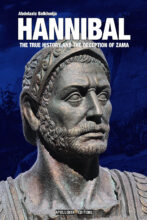Reading Note
« Hannibal, the True History and the Deception of Zama » offers a novel reading of Hannibal’s story in light of recent archaeological findings that contradict the narrative of historiographers as to the chronology and even the veracity of reported events. Abdelaziz Belkhodja suggests that history was deliberately falsified by “historians” or rather propagandists, because of its embedment within the political context of Rome’s surge towards empire and hegemony, in order to uphold a more glorious version of events.
I am delighted to bring Abdelaziz Belkhodja’s most recent edition of Hannibal, the True History and the Deception of Zama to the attention of an English-speaking readership. This book offers a novel reading of Hannibal’s story in light of recent archaeological findings, (specifically the dating of the circular harbor of Carthage) that contradict the narrative of historiographers as to the chronology and even the veracity of reported events. Furthermore, in this English edition (neither the French nor Arabic versions comprise these addenda), Abdelaziz Belkhodja scrutinizes ancient texts and picks up contradictions, inaccuracies, slips of the tongue, downright manipulations and fallacies. He suggests (using textual evidence to support his claim) that history was deliberately falsified by “historians” or rather propagandists, because of its embedment within the political context of Rome’s surge towards empire and hegemony, in order to uphold a more glorious version of events. However, spoiler alert, this introduction is only intended to whet your appetite. I must stop before saying too much about the unfolding of the plot. Read the book, you will discover for yourselves this exciting and unprecedented reading of ancient texts.
Nevertheless, before you start on your journey to Antiquity, I would like to get to my actual purpose in writing this note. I wish to inform readers of a request the author made. Indeed, as Carthage had been demonized for allegedly triggering the Punic Wars (totally untrue), and Hannibal had been endlessly slandered (for centuries) for being the instrument of said aggression on Rome in biased pro-Roman historiography, Belkhodja warned me not to fall into the same trap when alluding to the Romans and notedly to Scipio Africanus. He wanted his version of events to be objective and not downright defamatory. Translation is never a matter of simple word replacement. One of the greatest dilemmas for the translator is to make decisions in choice of words and expressions, as they have enormous impact on how texts are perceived, especially when sensitive issues are at stake and injurious or discriminatory language may be used. I tried to maintain a cautious objectivity, though I must admit that I may have been swayed to use positioned translating in certain instances, as issues developed were highly emotional. I cannot deny that I developed a passion for Hannibal and great admiration for his epopee. As a matter of fact, after translating the fourth chapter, I sent Abdelaziz an email in which I wrote: “I have been infected with Hannibal fever and I am becoming more and more passionate about the subject. I can hardly stop translating to eat and rest…”
Thus, I would like to make an acknowledgement of “mea culpa” if any expression used offends readers’ sensitivities, hoping that they will be indulgent as they take into account the challenge involved when translating Scipio’s controversial actions, of doing so without necessarily denigrating him for them.
For example, Scipio is bluntly termed a “manipulator” but to justify this characterization, the author writes a footnote in which he justifies this assertion in the following way : “Scipio’s many lies, the absence of high-ranking Roman officials at his side, his utter inversions of truth in the face of his compatriots themselves, cannot exclude the hypothesis of downright manipulation on his part.” This is not an exaggeration or a slur upon his character, mere facts are stated here which may be disappointing to his admirers, but this cannot be helped, for pro-Roman textual evidence supports these assertions.
All this to say that both Abdelaziz Belkhodja and myself, as he had recommended that I do, tried not to use objectionable language when speaking of Rome, Scipio and even when alluding to the undeniably contentious writings of Polybius and Livy, and I feel sure that we succeeded overall.
Finally, I also wish to mention in this foreword that I was delighted and honored to be entrusted with the translation of this fascinating and groundbreaking work.
Sonya Chaabane

Hannibal: The True History and the Deception of Zama (English Edition)

